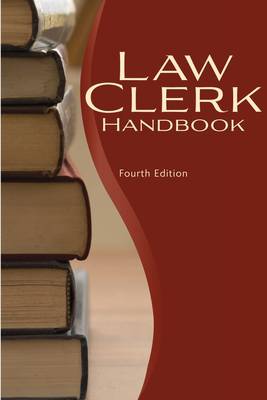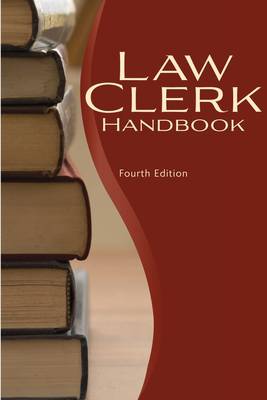
- Afhalen na 1 uur in een winkel met voorraad
- Gratis thuislevering in België vanaf € 30
- Ruim aanbod met 7 miljoen producten
- Afhalen na 1 uur in een winkel met voorraad
- Gratis thuislevering in België vanaf € 30
- Ruim aanbod met 7 miljoen producten
Zoeken
Law Clerk Handbook
A Handbook for Law Clerks to Federal Judges - Fourth Edition (2020)
Federal Judicial Center
Paperback | Engels
€ 20,95
+ 41 punten
Omschrijving
Law clerks have no statutorily defined duties; they carry out their judges' instructions. Because each judge decides cases individually and has developed work habits over the course of a professional career, no two judges use their clerks in exactly the same way. You will need to become familiar with your judge's style and work cooperatively with the other members of the chambers staff, so that as a team you can effectively assist the judge in fulfilling the judge's judicial responsibilities. In most chambers, law clerks concentrate on legal research and writing. Typically, a law clerk's broad duties include conducting legal research, preparing bench memos, drafting orders and opinions, editing and proofreading the judge's orders and opinions, and verifying citations. Many judges discuss pending cases with their law clerks and confer with them about decisions. District court law clerks often attend conferences in chambers with attorneys. Often, law clerks also maintain the library, assemble documents, serve as courtroom crier, handle exhibits during trial, and perform other administrative tasks as required by the judge to ensure a smooth-running chambers. Law clerks for district, bankruptcy, and magistrate judges have much more contact with attorneys and witnesses than their appellate court counterparts do. The primary function of an appellate court law clerk is to research and write about the issues presented on appeal, while law clerks for district, bankruptcy, and magistrate judges may be involved in the many decisions made at every stage of each case. Chapter 4 describes the operations of district, bankruptcy, and appellate courts in some detail.
Specificaties
Betrokkenen
- Auteur(s):
- Uitgeverij:
Inhoud
- Aantal bladzijden:
- 156
- Taal:
- Engels
Eigenschappen
- Productcode (EAN):
- 9781716557811
- Verschijningsdatum:
- 24/09/2020
- Uitvoering:
- Paperback
- Formaat:
- Trade paperback (VS)
- Afmetingen:
- 152 mm x 229 mm
- Gewicht:
- 217 g

Alleen bij Standaard Boekhandel
+ 41 punten op je klantenkaart van Standaard Boekhandel
Beoordelingen
We publiceren alleen reviews die voldoen aan de voorwaarden voor reviews. Bekijk onze voorwaarden voor reviews.











